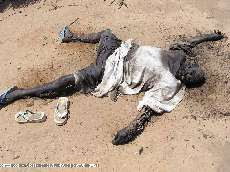crazy crazy news. i've been keeping up with this one for about a week or so: across the country, a definite rift is forming in the evangelical community. it appears to me that we might be witnessing a milestone in religious history taking place right before our eyes. could this be compared to the east-west schism of 1054 or the first and second great awakenings? who knows, but key players in modern evangelical society have taken a hard look at the current political agenda of the church, and have decided that a big change in direction is needed. yesterday, in lake forest, ca, senator barack obama addressed a congregation of two thousand at pastor rick warren's second annual global summit on aids. "warren, best-selling author of "the purpose driven life" and influential conservative evangelical, decided amidst much fanfare last year that conservative christians had for too long ignored those suffering with aids. and he decided that was not in keeping with the teachings of jesus," say jake tapper and dan morris of abc news. obama's invitation to speak to evangelicals has angered many in the church who believe that his liberal views on abortion rights are in direct conflict with the morality of the evangelical community, claiming that putting obama behind the pulpit loans him an undue religious credential. "sen. obama's policies would nullify the right to life, and right now, that is the paramount moral issue of our day," says rev. rob schenck, head of the national clergy council. also at odds with the current tenets of the evangelical church is rev. joel hunter, the president-elect of the christian coalition of america. hunter has resigned this week before his term began because of the board's strong opposition to his desire to expand the group's agenda beyond opposition to abortion and gay marriage. he claims "they really weren't ready to risk expanding into these other areas. they were afraid of alienating the base. . .frankly, one of the ways that you provoke the most response from people is through anger and through fear. it raises a bunch of money. it raises the level of exposure." "christians have spent so much time evangelizing their politics that they've really corrupted the name of jesus," says conservative evangelical david kuo, former deputy of the white house office of faith-based initiatives. "are they so blind and possessed with such a narrow definition of life that they can think of life only in utero?" all this added to the earth-shattering resignation of superpastor ted haggard, following allegations of three-years of meth-induced visits with a male prostitute, has left many southern baptists asking 'what would jesus do?'
yeah, what would jesus do? maybe he would remind us that the bible was, to begin with, a five-hundred-year-long game of telephone from mesopotamia to europe, followed by rough translations from ancient languages. the book contradicts itself all over the place. those who choose to accept the book as literal truth face a harsh reality that they alienate themselves from mainstream science. didn't god give us these powerful brains, with which, collectively, we have, over many many generations, learned so much that would fascinate jesus today? would he say darwin was wrong? would he be a liberal or conservative? would he be miffed at the crusades and other such mass killings in his name, which, after all, are obviously the only reasons christianity even exists in america and elsewhere? have you ever wondered what religion you'd instantly associate with and follow without question if you were born in iran; india; china; ancient greece, south america, or egypt? would jesus agree with and support our president? exactly which denomination of christianity would he find to be the most in tune with his philosophy? would he be happy that an overwhelming majority of people in our country base their scientific beliefs about the origins of life off of a text written around the time of the invention of the wheelbarrow? how would he feel about these gigantic evangelical revivals on television? the mass-marketing and commercial exploitation of his name? america's lack of compassion for the sick and dying in the third world? genocide? the iraq war? gay marriage? our unabashed destruction of wildlife? who knows, but what's funny to me about all of this is that although christians the world over are biding their time until the second coming of christ, watching football and sucking down burger king, when someone emerges, claiming to be the messiah, they send in the heavy artillery and take his ass out :)
 Democratic South Dakota Senator Tim Johnson could possibly have suffered a stroke today at around 11:30am in his Washington D.C. office. He is, at the time of my writing this, undergoing a comprehensive evaluation by the stroke team at George Washington University Medical Center. While I remain hopful that he will continue his senatorial duties through 2008, a gigantic question mark looms.
Democratic South Dakota Senator Tim Johnson could possibly have suffered a stroke today at around 11:30am in his Washington D.C. office. He is, at the time of my writing this, undergoing a comprehensive evaluation by the stroke team at George Washington University Medical Center. While I remain hopful that he will continue his senatorial duties through 2008, a gigantic question mark looms.










